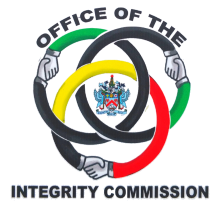What does the Integrity in Public Life Act really do?
The Integrity in Public Life Act of 2013 provides St. Kitts and Nevis with a legal framework through which government can curtail and investigate occurrences of corruption in public office through the establishment of an Integrity Commission; and where necessary, bring legal proceedings against public officials who violate the Act’s stipulations. The Act includes a code of conduct with which Public Officials are required to comply; and a declaration of interest that is required to be filed by Public Officials with the Integrity Commission. Also included in its provisions, are penalties for offences such as non-compliance, abuse of office, misconduct, and neglect of duty.
What is a declaration?
The term ‘declaration’ is defined as the collection of documents providing evidence of the declarant’s income, assets, liabilities, private interests, gifts in cash or kind that are received by himself or herself, his or her spouse or his or her dependent children. These documents include but are not limited to, formal bank statements, notarised certificates of title indicating land and/or house/building ownership, deeds, and any other official documents that indicate asset ownership and liability obligations of the declarant.
Who is a declarant?
A declarant is any public official or person in public life holding the job positions specified and fitting the criteria laid out in the First Schedule Section 2 of the Act.
How are declarations filed with the St. Kitts Integrity Commission?
Declarations are filed by completing the forms posted in the Act (and under the Forms section of this website) and following the accompanying instructions. The completed forms and supporting documents are then presented to officials of the Integrity Commission by the specified date for receipt and filing. When all requirements are met by the Declarant, a Certificate of Compliance is issued to the Declarant and published in the Gazette.
Are the declarations made public?
No. Declarations filed by public officials and persons in public life as per the Act’s stipulations are Confidential and not made public. They are vetted and verified by the Integrity Commission’s staff. Once the declarations are deemed to be in proper and legal order, they are filed and secured.
What happens if a public official files (a) a false declaration or falsifies part of their declaration, or (b) fails to comply with the IPL Act?
The Act explicitly discusses all the penalties and fines for any and all breaches of the legislation by public officials and holders of public office. False declarations carry a fine of up to $15,000 or imprisonment of up to 2 years.
Which public officials are mandated to file declarations with the St. Kitts Integrity Commission?
All public officials and holders of public office that fall under the Act’s purview are listed in First Schedule Section 2 of the Act.
What happens if a declarant fails or neglects to include one of his or her assets or financial statements when filing their declaration?
Where this is noted during the examination, the Declarant is contacted and asked to provide the relevant information/documents and an addendum made to the declaration. Where the official fails or refuses to provide the requested information, the matter is sent to the Director of Public Prosecutions (DPP) for prosecution. The penalty is a fine of up to $30,000 or imprisonment for up to 5 years.
Is there a deadline for filing?
The Minister is required to declare the date by which declarations for a specified financial period are to be made to the Integrity Commission.
Is there a deadline for bringing the government and the country into compliance with the IPL Act?
The Minister is required to declare the date by which declarations for a specified financial period are to be made to the Integrity Commission.
What happens if a public official refuses to file his or her declaration?
There are several actions that can be taken against that official. Prosecution by the DPP with a penalty of a fine of up to $30,000 or imprisonment up to 5 years.
How does a person make a formal complaint or report of [alleged] breaches of the Act?
The Regulations are to address the process for filing complaints. This is a serious matter and there are also penalties for false and frivolous complaints.
